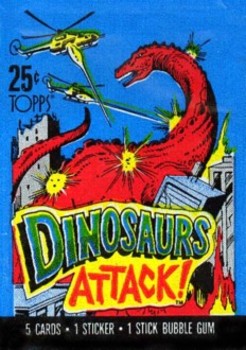
Mars Attacks is a science fiction-themed trading card series released in 1962 by Topps. The cards feature artwork by science fiction artists Wally Wood and Norman Saunders. The cards form a story arc, which tells of the invasion of Earth by cruel, hideous Martians under the command of a corrupt Martian government who conceal the fact from the Martian populace that Mars is doomed to explode and, therefore, proposes colonization of Earth to turn it into their new homeworld. The cards depict futuristic battle scenes and bizarre methods of Martian attack, torture and slaughter of humans, as well as various Earth nations being attacked. The story concludes with an expeditionary force of humans volunteering to embark on a counterattack on Mars, in which the Earth force attacks the Martians in their manner. This necessitates the Martians that are still on Mars to defend their homeworld. The Earth attack forces, after destroying the Martian cities and killing the Martians, depart just before Mars is destroyed in the predicted cataclysm, thus ensuring the peace and safety of Earth as the Martian race is seemingly doomed to extinction.

Garbage Pail Kids is a series of sticker trading cards produced by the Topps Company, originally released in 1985 and designed to parody the Cabbage Patch Kids dolls, which were popular at the time.
A trading card is a small card, usually made out of paperboard or thick paper, which usually contains an image of a certain person, place or thing and a short description of the picture, along with other text. When traded separately, they are known as singles. There is a wide variation of different types of cards.

A baseball card is a type of trading card relating to baseball, usually printed on cardboard, silk, or plastic. In the 1950s, they came with a stick of gum and a limited number of cards. These cards feature one or more baseball players, teams, stadiums, or celebrities.

The Topps Company, Inc. is an American company that manufactures trading cards and other collectibles. Formerly based in New York City, Topps is best known as a leading producer of baseball and other sports and non-sports themed trading cards. Topps also produces cards under the brand names Allen & Ginter and Bowman.

The Fleer Corporation, founded by Frank H. Fleer in 1885, was the first company to successfully manufacture bubble gum; it remained a family-owned enterprise until 1989.

Non-sport trading cards are a particular kind of collectible card designated as such because trading cards have historically prominently featured athletes from the world of sports as subjects. Non-sports cards are trading cards whose subjects can be virtually anything other than sports-themed.

Wacky Packages are a series of humorous trading cards featuring parodies of consumer products. The cards were produced by Topps beginning in 1967, first in die-cut, then in peel-and-stick sticker format. There were 16 series produced between 1973 and 1977, with some reprints and several new series released up to the present day.

Herbert Norman Schwarzkopf Jr. was a United States Army general. While serving as the commander of United States Central Command, he led all coalition forces in the Gulf War against Ba'athist Iraq.

The O-Pee-Chee Company, Ltd. was a Canadian confectionery company founded in 1911 based in London, Ontario. O-Pee-Chee was best known as a maker of trading cards. It entered into a marketing agreement with the Topps Company in 1958, releasing several collections of baseball, gridiron football and ice hockey cards.

Dinosaurs Attack! is a trading card series by Topps released in 1988 and containing 55 base cards and 11 sticker cards. The cards tell the story of dinosaurs transported through time into the present day through a freak accident and wreaking havoc on Earth. The series is notable for its graphic violence and gore, intended to evoke memories of the successful Mars Attacks trading card series of 1962.

An American football card is a type of collectible trading card typically printed on paper stock or card stock that features one or more American football players or other related sports figures. These cards are most often found in the United States and other countries where the sport is popular.

Star Wars trading card usually refers to a non-sport card themed after a Star Wars movie or television show. However a common colloquial reference to trading card can also include reference to stickers, wrappers, or caps (pog) often produced along the same theme. Usually produced as either promotional or collectible memorabilia relating to Star Wars, the cards can depict anything from screen still imagery to original art. In addition, there have been various companies that have issued promotional Star Wars trading cards that include reference to or information about that corresponding company.
Panini is an Italian company that produces books, comics, magazines, stickers, trading cards and other items through its collectibles and publishing subsidiaries. It is headquartered in Modena and named after the Panini brothers who founded it in 1961. Panini distributes its own products, and products of third party providers. Panini maintains a Licensing Division to buy and resell licences and provide agency for individuals and newspapers seeking to purchase rights and comic licences. Through Panini Digital the company uses voice-activated software to capture football statistics, which is then sold to agents, teams, media outlets and video game manufactures.

A basketball card is a type of trading card relating to basketball, usually printed on cardboard, silk, or plastic. These cards feature one or more players of the National Basketball Association, National Collegiate Athletic Association, Olympic basketball, Women's National Basketball Association, Women's Professional Basketball League, or some other basketball related theme.
Prizes are promotional items—small toys, games, trading cards, collectables, and other small items of nominal value—found in packages of brand-name retail products that are included in the price of the product with the intent to boost sales, similar to toys in kid's meals. Collectable prizes produced in series are used extensively—as a loyalty marketing program—in food, drink, and other retail products to increase sales through repeat purchases from collectors. Prizes have been distributed through bread, candy, cereal, cheese, chips, crackers, laundry detergent, margarine, popcorn, and soft drinks. The types of prizes have included comics, fortunes, jokes, key rings, magic tricks, models, pin-back buttons, plastic mini-spoons, puzzles, riddles, stickers, temporary tattoos, tazos, trade cards, trading cards, and small toys. Prizes are sometimes referred to as "in-pack" premiums, although historically the word "premium" has been used to denote an item that is not packaged with the product and requires a proof of purchase and/or a small additional payment to cover shipping and/or handling charges.
An association football card is a type of trading card relating to association football, usually printed on cardboard, silk, or plastic. These cards feature one or more players, clubs, stadiums, or trophies. Football cards are most often found in Europe, Asia and South America.

Merlin Publishing Limited, commonly known as Merlin and sometimes branded as Merlin Collections was a British publishing firm who released a variety of sticker collections during the late 1980s and 1990s, they also designed trading cards, card games and pogs. Although most notably releasing football stickers in particularly for the Premier League and Serie A, they also designed collections around television shows and other points of interest.
Pacific Trading Cards, Inc. was an American trading card company founded in 1980 by Mike Cramer and known for its brightly colored, die cut cards. The company invented the nine-card plastic sheets collectors use to store trading cards. The company also produced memorabilia such as bobbleheads and the Ken Griffey Jr. chocolate bar. The company was purchased by Playoff in 2004. In 2021, a Tom Brady rookie card produced by Pacific sold for $117,000 eBay.














